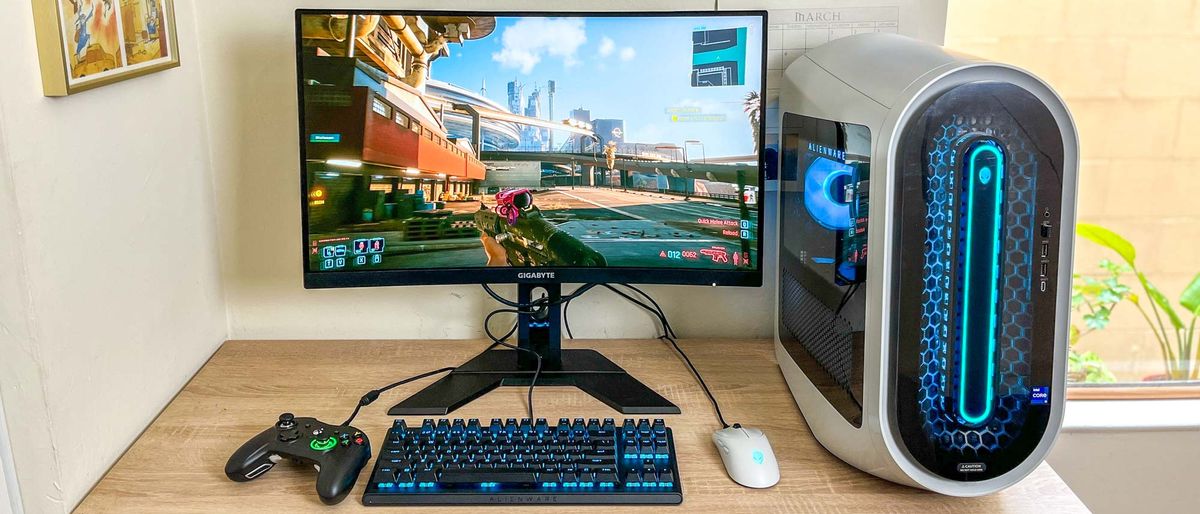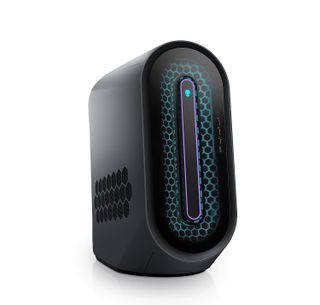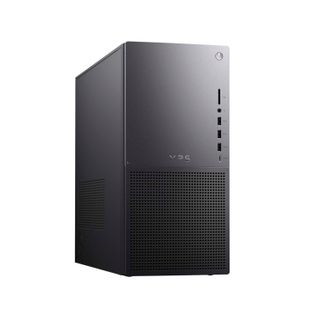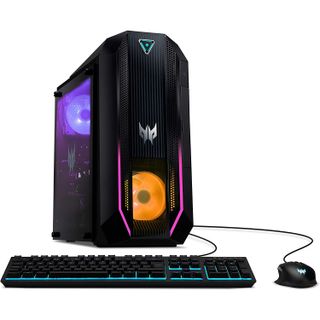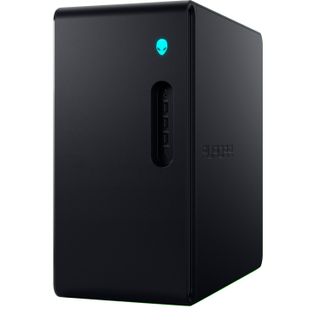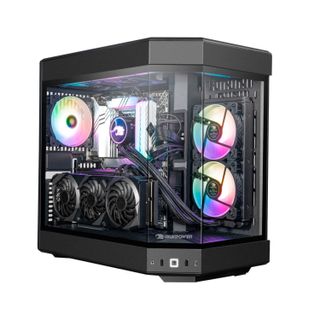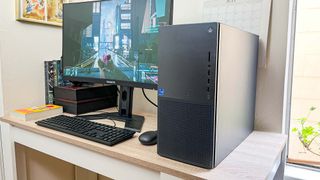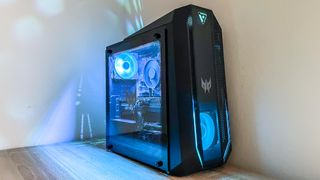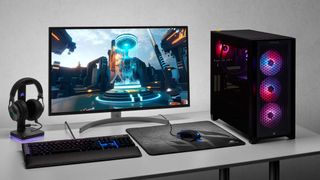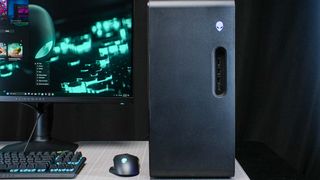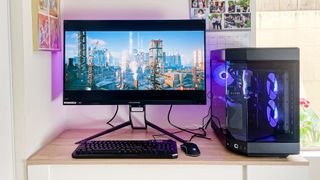The best gaming PCs are powerful enough to run even the most demanding video games well and do so in the biggest and most elegant design possible. While these machines are in some ways the epitome of what a PC can be, they often come with steep price tags. While the lofty costs you pay for a top-of-the-line gaming PC are nothing to shrug at, the benefits you reap are often worth the cost of entry.
On top of experiencing games at blazing-fast frame rates and ultra-high resolution, these high-priced computers are often well-suited to demanding work in fields like game development, graphic design and animation. If you’re interested in what generative AI can do, the beefy GPUs in the best gaming PCs are also well-suited to tasks like generating art via tools like Stable Diffusion.
We test all the new gaming PCs (in both our testing lab and our homes) to see if they pass muster, and we regularly update this page as systems become available. Read on, and we’ll help you find your next great gaming machine.
Tony Polanco
Tony is a Senior Staff Writer at covering laptops, tablets, Windows, and iPadOS. During his off-hours, Tony enjoys reading comic books, playing video games, reading speculative fiction novels, and spending too much time on Twitter. His work has appeared in publications such as Laptop Mag, PC Mag, and various independent gaming sites.
The quick list
Here’s a quick overview of the best gaming PCs you can buy right now based on our testing and reviews.
The best gaming PC overall
The Alienware Aurora R15 is an excellent gaming PC that improves upon its predecessors in a few key ways, packing the most powerful components you can afford in an attractive, easy-to-open chassis. If you can afford it this is a top-tier gaming PC.
The best non-descript gaming PC
The Dell XPS 8960 proves that a gaming PC doesn’t need to have an ostentatious design to be worth buying. As with its predecessors, this desktop seems more suited to an office setting than one’s personal gaming den. But it has more than enough power.
3. Acer Predator Orion 3000
Best gaming PC for beginners
The Acer Predator Orion 3000 is a mid-sized gaming PC that’s attractive, (relatively) affordable, and great for playing games at 1080p to 1440p. The case is well-organized and easy to open, so it should be pretty easy to upgrade this machine with more RAM when you need it.
4. Corsair Vengeance i7200
The best RGB lighting
Apart from its powerful gaming performance, the Corsair Vengeance i7200 features beautiful RGB lighting, a tasteful glass side panel and extremely quiet fans. That makes it a good productivity tool in addition to a gaming powerhouse. There’s almost certainly a Vengeance i7200 build that will work with your setup.
The best mid-range gaming PC
The Alienware Aurora R16’s Legend 3.0 design gives it a more subdued appearance than its predecessors. While it may not look ultra-futuristic, it’s got power where it counts. And all that power won’t cause the Aurora R16 to melt thanks to its advanced cooling tech that keeps the PC running cool and quiet.
The best mid-tower gaming PC
The iBuyPower Y60 is a great gaming PC if you want an eye-catching system that plays games well while showcasing what’s inside to full effect. You can order a prebuilt Y60 system from iBuyPower or have them build one to order for you, making this a great choice for someone who knows what they want.
The best gaming PCs you can buy right now
The best gaming PC overall
The Alienware Aurora R15 is an excellent gaming PC that improves upon its predecessors in a few key ways, packing the most powerful components you can afford in an attractive, easy-to-open chassis.
Alienware claims to have redesigned it to run cooler and quieter than the older Aurora gaming PCs, and our experience putting a top-tier review unit through its paces bears that out. The Aurora R15’s sleek oblong case isn’t as easy to work inside as some larger cases, and some design choices make upgrading components harder than necessary, but that’s the price you pay for its well-organized good looks.
If you can afford it, Alienware will fill the Aurora R15 with top-of-the-line components that make it a top-tier gaming PC. At roughly $5k our review unit is far from cheap, but it’s powerful enough to play the latest and greatest games in 4K for years to come.
Make sure you check our Dell coupons page to find the latest discounts.
Read our full Alienware Aurora R15 review.
The best non-descript gaming PC
The Dell XPS 8960 (starting at $2,749) proves that a gaming PC doesn’t need to have an ostentatious design to be worth buying. As with its predecessors, the Dell XPS 8950 and Dell XPS 8940, this desktop seems more suited to an office setting than one’s personal gaming den. But despite its boring appearance, the XPS 8960 has more than enough power to run the best PC games—if you pay for the right components.
As usual, Dell offers a slew of configuration options for this desktop that let you put up to the latest and greatest PC parts inside, including the latest Intel Raptor Lake 13th Gen chips and Nvidia GeForce RTX 4000 series GPUs. While the 8960 initially went on sale at a much higher price than its predecessors (from $2,749 up to $5k if you splurge), that’s likely because Dell launched the higher-end configs first. We expect to see less powerful, more affordable XPS 8960 models hitting the market throughout the year, so keep an eye out if you want a gaming PC this subtle but don’t want to pay for all this power.
Read our full Dell XPS 8960 review.
The best gaming PC for first-timers
The Acer Predator Orion 3000 is a mid-sized gaming PC that’s attractive, (relatively) affordable, and great for playing games at 1080p to 1440p.
It’s not a great choice if you’re looking to play games at 4K, however, and its packed-in keyboard and mouse leave much to be desired. The Orion 3000 also fared slightly worse in our suite of performance tests than some similarly-priced gaming PCs, perhaps because our review unit arrived with just 16GB of RAM.
The case is well-organized and easy to open though, so it should be pretty easy to upgrade this machine with more RAM when you need it. With its sub-$2,000 price, beefy components, and stylish, accessible case, Acer’s Predator Orion 3000 is a great first gaming PC for someone looking to get into the hobby.
Read our full Acer Predator Orion 3000 review.
The best gaming PC for RGB lighting
The Corsair Vengeance i7200 doesn’t cost nearly as much as some of its competitors, but it still gives you access to some of the most powerful hardware on the market. That’s because the Vengeance i7200 comes in a plain-looking case, and doesn’t include any peripherals. But if you prefer substance to style, this is probably the right gaming PC for you. With CPUs up to an Intel Core i9 and GPUs up to an Nvidia GeForce RTX 3090, you can make a beast of a machine — if you can pay for it.
Apart from that, the Vengeance i7200 features beautiful RGB lighting, a tasteful glass side panel and extremely quiet fans. That makes it a good productivity tool in addition to a gaming powerhouse. Whether you game in QHD or 4K, there’s almost certainly a Vengeance i7200 build that will work with your setup.
Read our full Corsair Vengeance i7200 review.
The best mid-range gaming PC
The Alienware Aurora R16 ($1,749 to start) is the latest in the company’s line of Aurora gaming PCs, though you could be forgiven for not initially recognizing this rig as a gaming machine.
Unlike its predecessor the Alienware Aurora R15, which sports an ultra-futuristic design that screams “gaming PC,” the Aurora R16’s Legend 3.0 design is decidedly subdued. Minor flourishes aside, this Alienware desktop wouldn’t look out of place in an office.
While it may not look flashy, it’s got power where it counts since you can configure this rig with the latest Intel processors and Nvidia GeForce RTX 40 series GPUs. And all that power won’t cause the Aurora R16 to melt thanks to its advanced cooling tech that keeps the PC running cool and quiet.
Read our full Alienware Aurora R16 review.
The best mid-tower gaming PC
The iBuyPower Y60 is a great gaming PC if you want an eye-catching system that plays games well while showcasing what’s inside to full effect.
Our review unit packed powerful components inside the Hyte Y60, a mid-tower case from iBuyPower’s sibling brand that’s nearly all tempered glass on two sides, making it look a bit like a giant fish tank. While it’s a bit heavy and unwieldy to move around, once you have the case in place it’s quite roomy and easy to work in — though our review unit kicks out quite a bit of heat once you start gaming with gusto.
You can order a prebuilt Y60 system from iBuyPower or have them build one to order for you, making this a great choice for someone who knows what they want and has enough desk space to showcase the Y60 to full effect.
Read our full iBuyPower Y60 review.
How to choose the best gaming PC
Price: If affordability is your concern, most decent gaming PCs start around $700 to $1,000. For that price, you’re looking at basic specs such as an Intel Core i5 processor, Nvidia 2000-series GPUs and 8GB to 16GB of RAM.
Performance: Think about the type of gaming experience you’re after. Game streaming services like Google Stadia can offer decent performance, but if its solid 1080p/60fps gaming you want, a machine with a decent Core i5 processor and GeForce 2060 or AMD Radeon RX 5600 GPU will get you there. Cards such as the Radeon RX 5700 and GeForce 2080 hit a nice sweet spot for dependable 1440p gaming. Going 4K? You’ll want to spring for hardware such as an RTX 3080 or AMD RX 6800.
Upgradability: Gaming PC components are always evolving, and the best gaming PCs can be easily upgraded with new parts over time. Machines such as the Alienware Aurora and Dell G5 are easy to open up and tinker with, even for the less tech-savvy. Compact machines, such as the Corsair One, can be a bit harder to open up. So if you plan on upgrading your investment over time, keep this in mind.
VR-readiness: Want to game in VR? Requirements for headsets such as the Oculus Rift S and HTC Vive start at an Nvidia GTX 1050 Ti / AMD Radeon RX 470 GPU, an Intel Core i3 or Ryzen 3 processor, 8GB of RAM and a DisplayPort 1.2 or mini DisplayPort. Make sure your machine meets this requirement before you plunk down cash for one.
How we test the best gaming PCs
In our search to find the best gaming PC, we run every model we review through a standardized gauntlet of real-world and benchmark tests, in order to measure how each desktop stacks up as both a gaming machine and as an everyday computer.
As far as hard numbers go, we currently run the framerate benchmark utilities for Shadow of the Tomb Raider, Far Cry: New Dawn, Red Dead Redemption 2 and Grand Theft Auto V at 1920 x 1080 with graphics maxed out, as well as at 2560 x 1440 and 4K if a system allows for it. On top of that, we play tons of graphics-intensive games in order to give you a sense of how these gaming desktops hold up anecdotally.
In terms of synthetic tests, we run a gamut of benchmarks that include 3DMark Fire Strike Ultra (for graphics) and Geekbench 4 and 5 (for processor performance). We also run the SteamVR Performance Test on all of our machines to evaluate how ready they are for virtual reality. To test a system’s hard drive, we measure how fast each PC can copy 4.97GB worth of multimedia files.
For more information, check out our how we test page for Tom’s Guide.





